Award-Winning Chicago Personal Injury Lawyer - Securing Justice
for Illinois Injury Victims - Over $450 Million Recovered
If you were injured on the job in Chicago or anywhere else in Illinois, a Chicago workers’ compensation lawyer from Rosenfeld Injury Lawyers can help you file a claim and ensure that you receive the benefits you’re entitled to by Illinois law.
Our experienced attorneys understand the complexities of the workers’ compensation system and are committed to helping injured workers secure fair compensation for medical expenses, lost wages, and ongoing disability.
We’ve represented thousands of injured employees across Chicago, Cook County, and surrounding areas, helping them recover compensation for medical bills, wage loss, and long-term disability. From traumatic brain injuries to repetitive stress injuries, we fight to ensure the insurance companies fulfill their obligation when a work-related injury happens.
Whether your injury occurred on a construction site, in a hospital, or in an office, our workers’ compensation attorneys will guide you through every step of your case. No matter if you’re a nurse, factory worker, union electrician, or delivery driver, if you’ve suffered injuries while performing job-related duties, we understand the physical, emotional, and financial stress that follows.
We’re here to help provide injured workers the advocacy they need to navigate the claims process, challenge denials, and hold insurance companies accountable. Our Chicago-based law firm offers a free consultation, so contact us today to learn how we can help you file a workers’ compensation claim and protect your rights under Illinois law.
At Rosenfeld Injury Lawyers, our Chicago work injury attorneys have decades of experience fighting for the rights of injured workers and their families, such as the following.
Warehouse Roof Collapse Injures Four Workers in Cicero
During a shift at a distribution center just outside Chicago, four warehouse employees were seriously injured when part of the roof suddenly collapsed onto their workstations. One of the injured, Luis, suffered spinal trauma and required multiple surgeries. Our team investigated the building’s maintenance history and discovered long-standing structural concerns that had been ignored. The case resolved for $14.2 million, reflecting the severity of the injuries and the property owner’s failure to address known risks.
Forklift Incident Kills Temporary Worker at Chicago Dock
Jamal, a 28-year-old temp worker, was fatally struck by a forklift while assisting with overnight loading at a South Sideshipping yard. Although the company argued that he was in a restricted area, our attorneys demonstrated poor training procedures and a lack of visible signage. After intense mediation, the family secured an $11 million settlement for wrongful death and loss of support.
Chemical Burn at Food Processing Plant in Joliet
While cleaning a storage tank at a food manufacturing facility, 33-year-old Denise was doused in caustic chemicals due to a malfunctioning valve. She sustained second- and third-degree burns across her arms and torso, requiring multiple skin grafts. OSHA violations and the plant’s poor emergency protocols contributed to a $7.4 million recovery.
Punch Press Crushes Worker’s Hand in West Chicago
Mark, a machinist at a suburban metal stamping plant, was operating a punch press when the defective safety guard failed. His dominant hand was crushed, resulting in amputation. The machine had a documented repair backlog and lacked proper lockout/tagout compliance. The $7 million settlement factored in future earnings loss and permanent disability.
Factory Worker Loses Fingers in Equipment Malfunction
A longtime assembly line worker, Andre, lost three fingers from his right hand when a defective part on a production press failed to retract. Despite complaints about the equipment weeks prior, no repairs were made. His $5.1 million settlement reflected both the extent of the injury and the manufacturer’s product liability.
Electrician Falls from Ladder at Loop Office Renovation
Tony was installing recessed lighting at a downtown Chicago office tower when a ladder provided by the property management company buckled beneath him. He fell 12 feet and suffered a pelvic fracture and traumatic brain injury. Surveillance footage and expert testimony led to a $4.9 million settlement.
Chemical Plant Shock Injury from Faulty Extension Cord
While overseeing repairs in a temporary site office in Bedford Park, plant manager Greg was electrocuted by a frayed extension cord that had been hastily installed during a renovation. He sustained nerve damage and missed nearly a year of work. His $3.04 million recovery included damages for pain, lost income, and long-term rehabilitation needs.
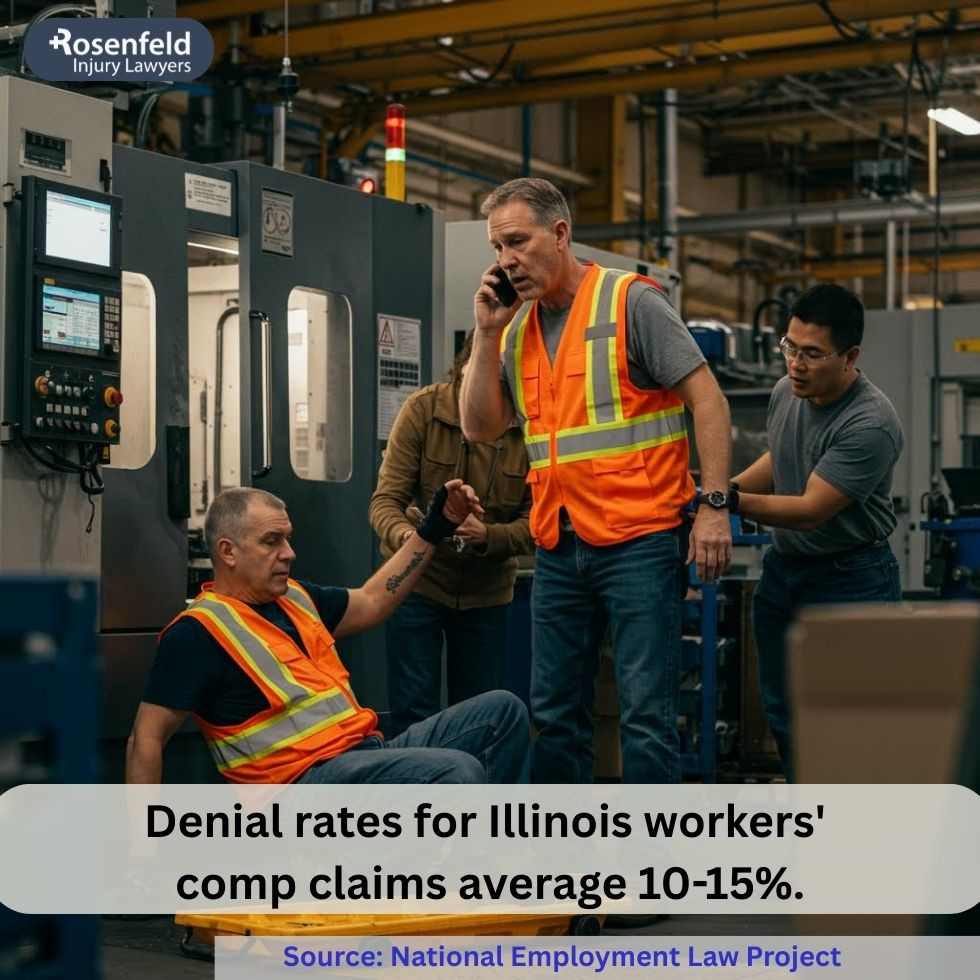
When you’ve been injured on the job, choosing the right legal team can make all the difference. At Rosenfeld Injury Lawyers, we are proud to be recognized as one of the top-rated workers’ compensation law firms in Illinois. Our experienced team of workers’ compensation attorneys has represented thousands of injured workers, helping them recover compensation for lost wages, medical bills, and long-term disability caused by workplace injuries.
We understand how difficult it is to deal with insurance companies while you’re trying to heal from a work-related injury. From denied medical bills to delayed care and wage disputes, insurers use every tactic to minimize what they owe. That’s why we fight aggressively to protect your rights and make sure you receive the full workers’ compensation benefits you rightfully deserve.
Here’s what sets our workers’ compensation lawyers apart:
From initial filing to appeals and settlement negotiations, our leading workers’ compensation lawyers will handle every part of the claims process. We help injured employees understand their rights, document their injuries, and fight for the compensation they need to move forward.
Workers’ compensation is a no-fault system in Illinois that provides benefits to employees who suffer work-related injuries or illnesses. Under the Illinois Workers’ Compensation Act (820 ILCS 305/), most employers are required to carry workers’ compensation insurance to help cover medical expenses, lost wages, and disability benefits when someone gets hurt on the job—no matter who was at fault.
The process is overseen by the Illinois Workers’ Compensation Commission (IWCC), which handles disputes and enforces compliance. If you’ve been injured while performing job-related duties, a skilled Chicago workers’ compensation lawyer can guide you through your claim and make sure your rights are fully protected.
Not every workplace injury automatically qualifies for workers’ compensation benefits under Illinois law. While most work-related injuries are covered, there are some important exceptions that can lead to a denied workers’ compensation claim. Knowing these limitations can help you prepare if your employer or insurance company pushes back on your case.
One major exception involves intentional harm by your employer. If you’re assaulted or deliberately injured on the job, you may have grounds for a personal injury lawsuit instead of a standard workers’ compensation case, but not both.
Another issue arises when an employer fails to carry workers’ compensation insurance. State law requires most businesses to provide coverage. If they don’t and an injury occurs, you may be able to take legal action directly against the employer through a civil suit.
Some injuries—especially those related to long-term toxic exposure—may not show up right away. Recent updates to the Illinois Workers’ Compensation Act and the Workers’ Occupational Diseases Act now allow workers to bring civil claims for illnesses like mesothelioma, even decades after exposure. These claims can move forward outside of the traditional workers’ compensation system.
Other exclusions include:
If your case involves any of these exceptions, talk to a knowledgeable Chicago workers’ compensation lawyer. They can help you determine if you still qualify for benefits or if a personal injury claim may be the better path forward.
Not every worker injured on the job qualifies for benefits under the Illinois Workers’ Compensation Act. While most employees are protected, certain job categories fall outside of coverage, either by the nature of the work or because separate laws govern them. Knowing whether you’re eligible is a key step in pursuing the compensation you may deserve.
Here are common situations where workers may not qualify:
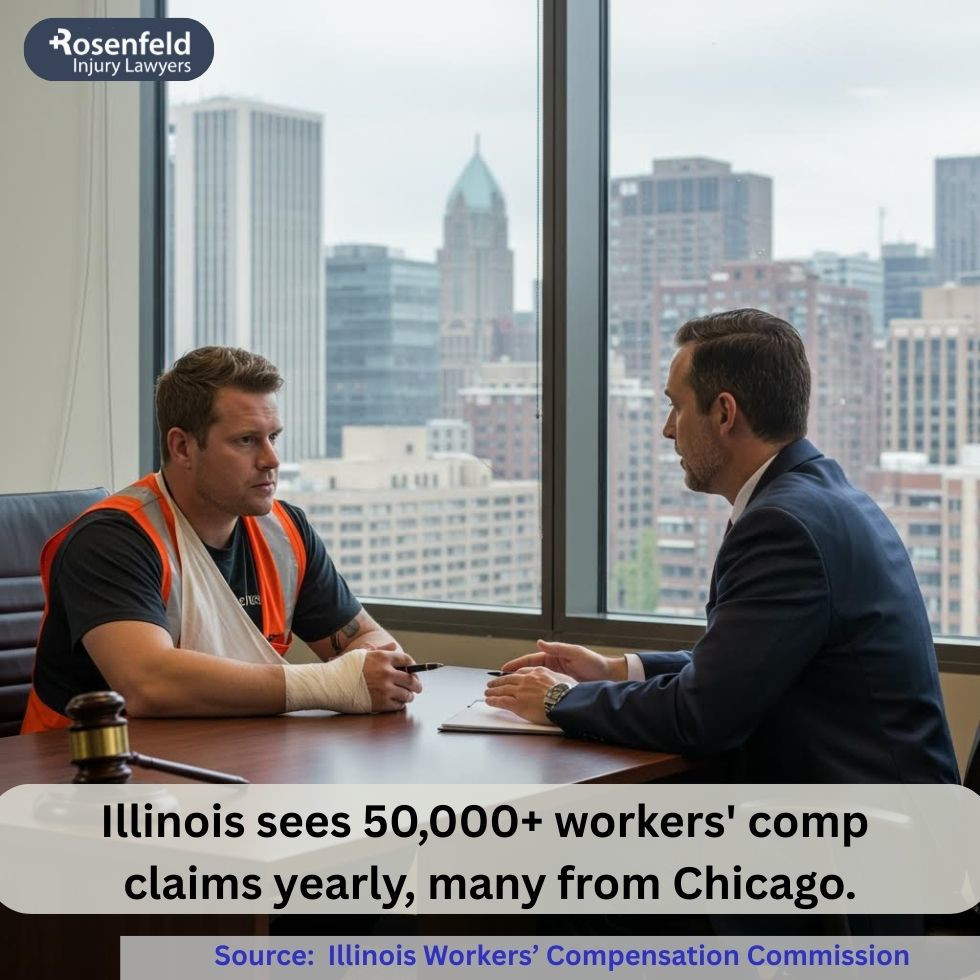
If you’ve been injured on the job, understanding what benefits are available under the Illinois workers’ compensation system is crucial. The law provides several categories of financial and medical support to help injured workers recover, cover expenses, and regain stability. These benefits are available regardless of fault, meaning you don’t have to prove employer negligence to obtain compensation.
Still, insurance companies are known to dispute claims, delay medical care, or reduce payouts unfairly. If you suffer injuries in a work-related accident or are unsure about what you may be entitled to under workers’ compensation law, don’t navigate the process alone.
A qualified workers’ compensation lawyer can help guide you through every step, from filing your initial workers’ comp claim to appealing a denial or negotiating a settlement. If you’ve received medical bills you shouldn’t be paying, or if the insurance company pays less than it should, our legal team can help you recover compensation and ensure your rights are protected.
Here’s a detailed overview of the types of workers’ compensation benefits that injured employees may be entitled to under Illinois law.
One of the core benefits available to workers injured on the job is full coverage of medical treatment. Under state workers’ compensation laws, employers are required to pay for all reasonable and necessary medical care related to a work-related injury. Covered expenses include:
Injured workers are allowed to choose up to two treating physicians. Any additional doctors must be referrals from your initial provider and don’t count against this limit. While medical treatment is a guaranteed benefit, insurance companies often attempt to delay or deny approval. Disputes over care—such as surgery authorization or treatment duration—can complicate the claims process, making legal guidance from experienced workers’ compensation attorneys essential.

If your injury prevents you from working at all during recovery, you may qualify for temporary total disability benefits. This benefit is paid at two-thirds (66.66%) of your average weekly wage (AWW). TTD begins after a 3-day waiting period, unless your work absence exceeds 14 days, in which case, you’ll be paid retroactively from day one.
You’ll continue receiving TTD payments until your doctor states you’ve reached maximum medical improvement (MMI), or until you’re medically cleared to return to your job or modified duties. This is especially relevant for construction workers, union workers, and healthcare workers with physically demanding roles.
Temporary partial disability benefits apply when you’re cleared to return to work in a limited capacity (light duty or part-time) and are earning less than you did before the injury. TPD pays two-thirds of the difference between your pre-injury wage and your current reduced wage. This benefit helps injured employees stay financially afloat while gradually resuming job responsibilities.
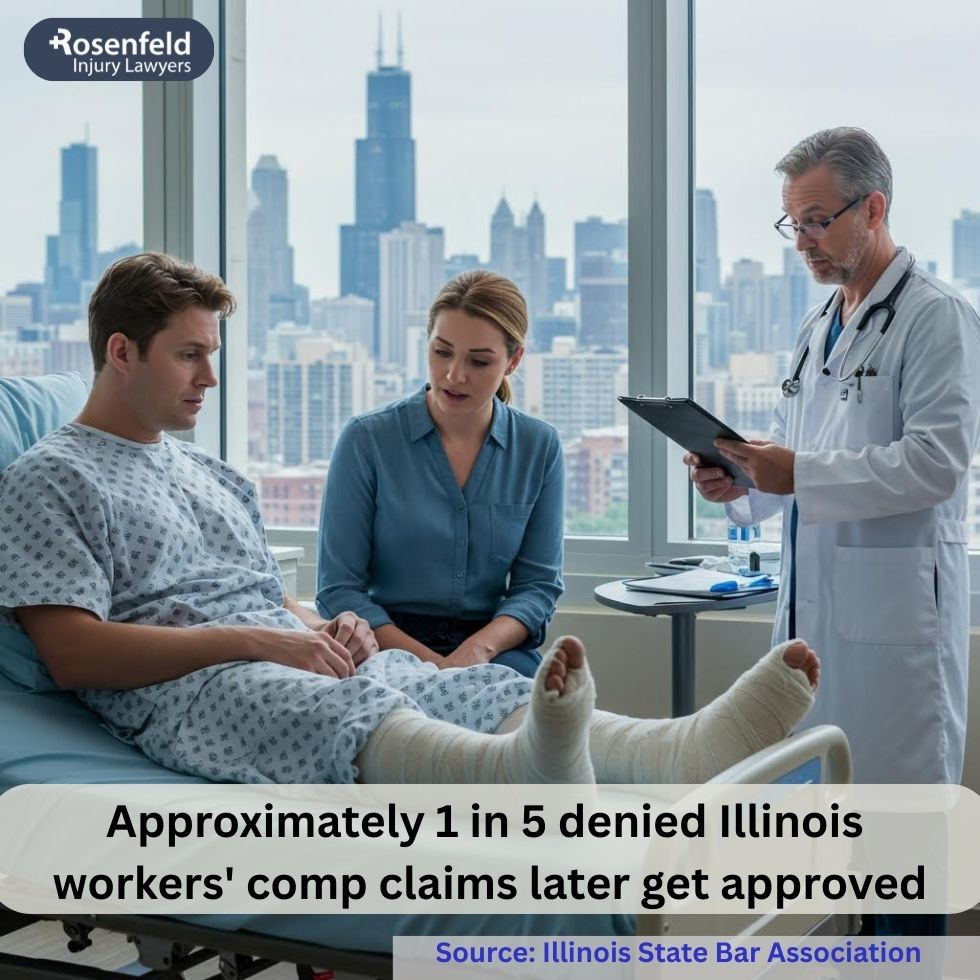
Permanent partial disability benefits are designed to support workers who suffer permanent damage but can still perform some work. If your work-related injury results in lasting impairment, you may qualify for compensation through one of the following categories:
Each benefit is calculated based on your AWW, the severity of your condition, and how the injury affects your future earning capacity.
When an injury causes permanent loss of function to a specific body part, such as a hand or foot, you’re entitled to a fixed number of benefit weeks under Illinois law. The standard payout is 60% of your AWW multiplied by the percentage of loss and the number of weeks allocated for that body part.
For example, if you suffer a 40% loss of function in a hand that’s scheduled for 205 weeks, you’d be eligible for compensation covering 82 weeks. These types of claims often arise in repetitive stress injuries like carpal tunnel syndrome or from traumatic events like crush injuries or amputations.
If your injury isn’t listed on the state’s schedule—such as spinal cord injuries, hip damage, or back injuries—compensation is based on your level of impairment and its impact on your ability to work. The Illinois Workers’ Compensation Commission uses a formula that factors in a 500-week scale and your degree of impairment, which must be supported by medical evaluations and expert opinions. These awards are often contested by insurance companies, so it’s critical to have a workers’ compensation lawyer who can document your injuries and challenge unfair denials.
When an injured worker cannot return to their previous high-paying job and must accept a lower-wage position, they may qualify for wage differential benefits. These benefits pay two-thirds of the difference between the old wage and the new reduced wage and may continue for up to five years or until age 67, whichever comes first. This benefit is particularly helpful for construction workers, healthcare workers, and others in dangerous jobs whose injuries prevent them from returning to physically demanding roles.
Workers who suffer visible scars or other permanent damage to areas such as the face, neck, hands, or arms may receive disfigurement benefits. Illinois law allows up to 162 weeks of compensation at 60% of your AWW. Photos, witness statements, and medical testimony are often used to support the value of disfigurement claims.
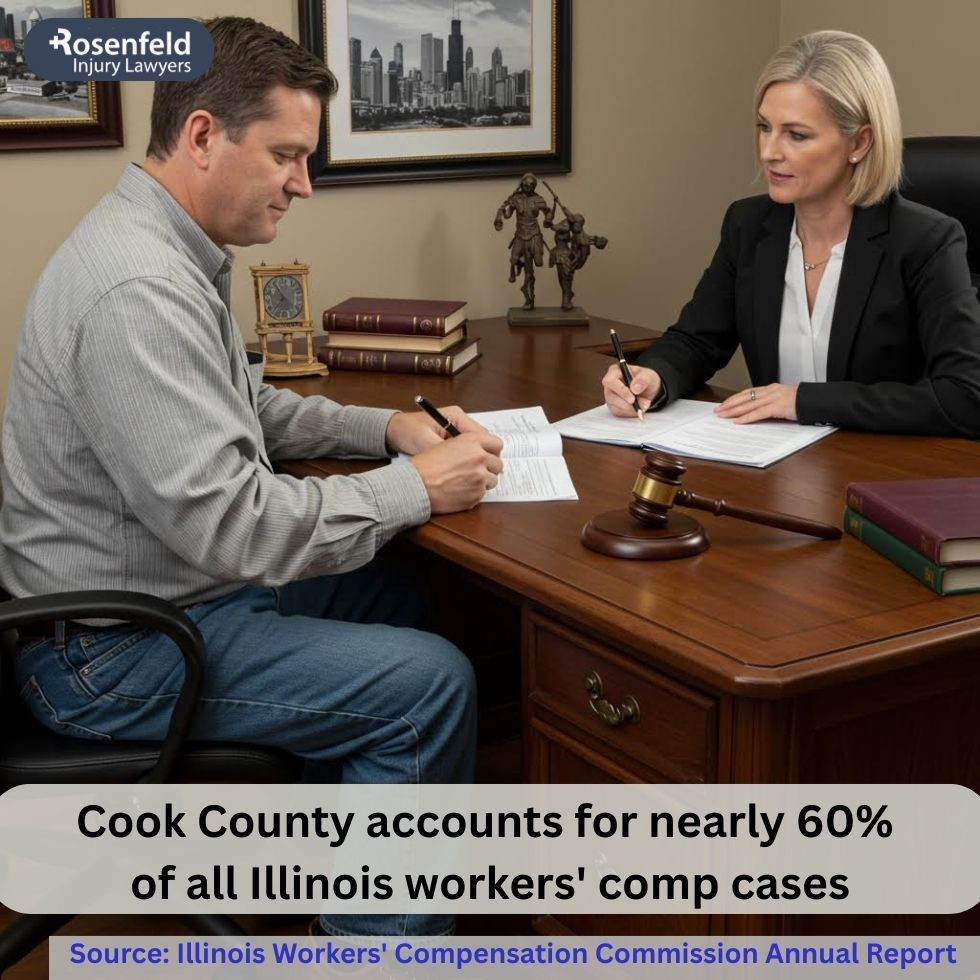
If a work-related accident leaves you unable to work in any capacity for the rest of your life, you may be eligible for permanent total disability benefits. PTD pays two-thirds of your AWW for life and may include annual cost-of-living adjustments. To qualify, injured workers must prove they are completely unemployable. This typically includes those who have lost the use of both hands, arms, legs, feet, or eyes. PTD claims are frequently challenged by insurance companies due to their long-term financial impact, so representation by a knowledgeable workers’ compensation attorney is essential.
Illinois workers’ compensation law recognizes that some injured employees may not be able to return to their previous line of work. In such cases, vocational rehabilitation benefits can help. This may include job retraining, career counseling, education programs, and job placement assistance. While you’re participating in a vocational program, you can also receive maintenance benefits equivalent to your TTD rate. If your employer’s workers’ compensation insurance carrier denies access to rehab programs or tries to terminate benefits prematurely, an experienced law firm can intervene to help protect your rights.
When a worker dies from a workplace injury, their surviving family members may be entitled to death benefits under Illinois workers’ compensation law. These include:
Death benefits are typically available to surviving spouses, minor children, or other financially dependent relatives. These claims often require legal representation, especially if there are disputes about who qualifies as a dependent or if insurance companies try to deny the claim.
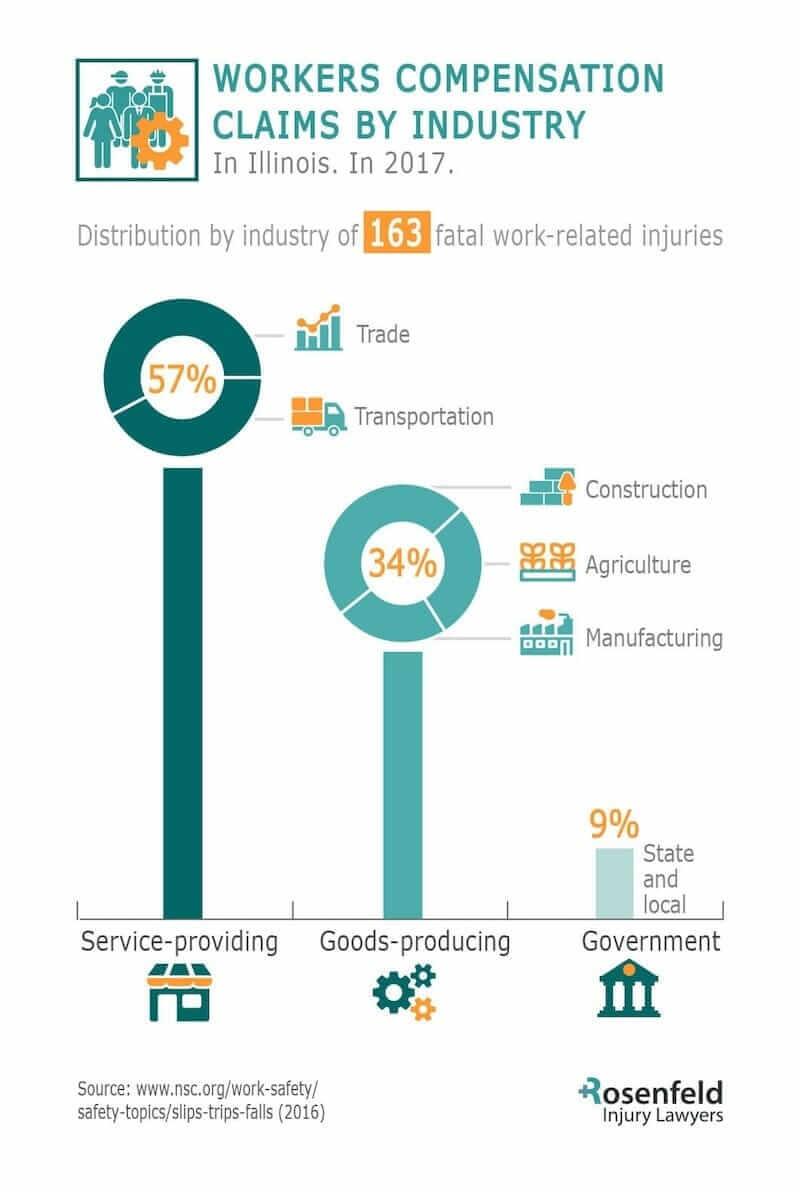
According to Law.com’s Verdict Search, the average workers’ compensation payout in Chicago is $2,077,082, with a median value of $317,985. These figures can range from as low as $17,768 to as high as $24,320,000, based on a broad set of data, including verdicts, settlements, and arbitration awards from across Illinois, with a concentration in Cook County, where a high volume of work injury cases are filed and resolved each year.
These numbers represent both negotiated settlements and awards issued through the IWCC, reflecting a wide range of injuries, industries, and case outcomes. It’s important to understand that while these averages provide a general benchmark, the value of an individual workers’ compensation claim can vary significantly depending on the specific circumstances of the case.
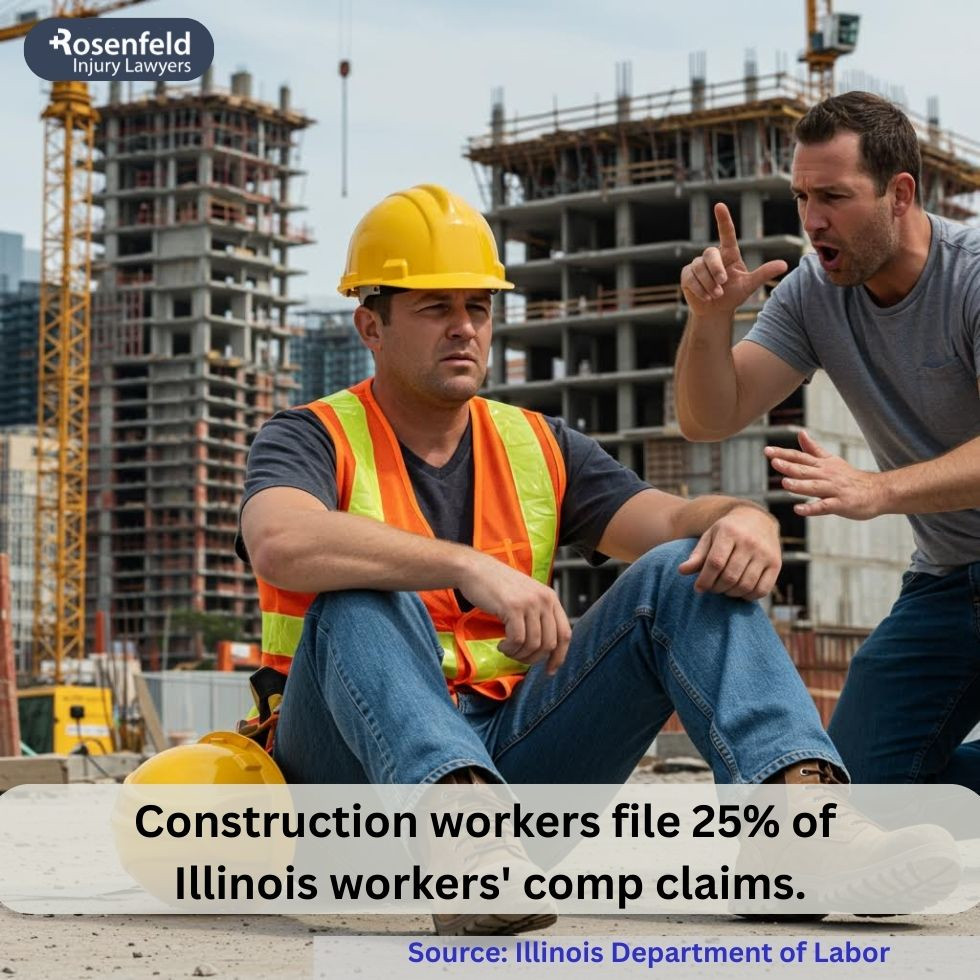
Several key factors affect how much a case may settle for, including:
An experienced Chicago workers’ compensation lawyer can evaluate all aspects of your claim—including your injury type, employer practices, and the strength of supporting medical evidence—to determine what full and fair compensation should look like in your case. We’ll also ensure the insurance company pays what you’re truly entitled to, and that your settlement includes everything from medical care and disability benefits to future support if needed.
Jury Awards $24.3M to Injured Construction Worker After Collapse
A construction worker suffered catastrophic injuries when a concrete form system failed during a pour, causing the floor to collapse. He was trapped for several hours, and both lower legs were crushed, one of which required partial amputation. He now walks with a cane, uses leg braces, and is unable to return to construction work. He also developed post-traumatic stress disorder and will undergo future surgeries.
The failure was traced to a defective forming and shoring system. A whistleblower testified that the equipment had not been adequately tested or safely designed. The worker sought damages for lost income, future earning capacity, pain and suffering, and medical expenses. His wife filed a claim for loss of consortium.
The jury awarded $24.3 million, including $15 million in punitive damages. Fault was assigned 80% to the equipment manufacturer and 20% to the contractor. The contractor was shielded from liability because the worker received workers’ compensation benefits.
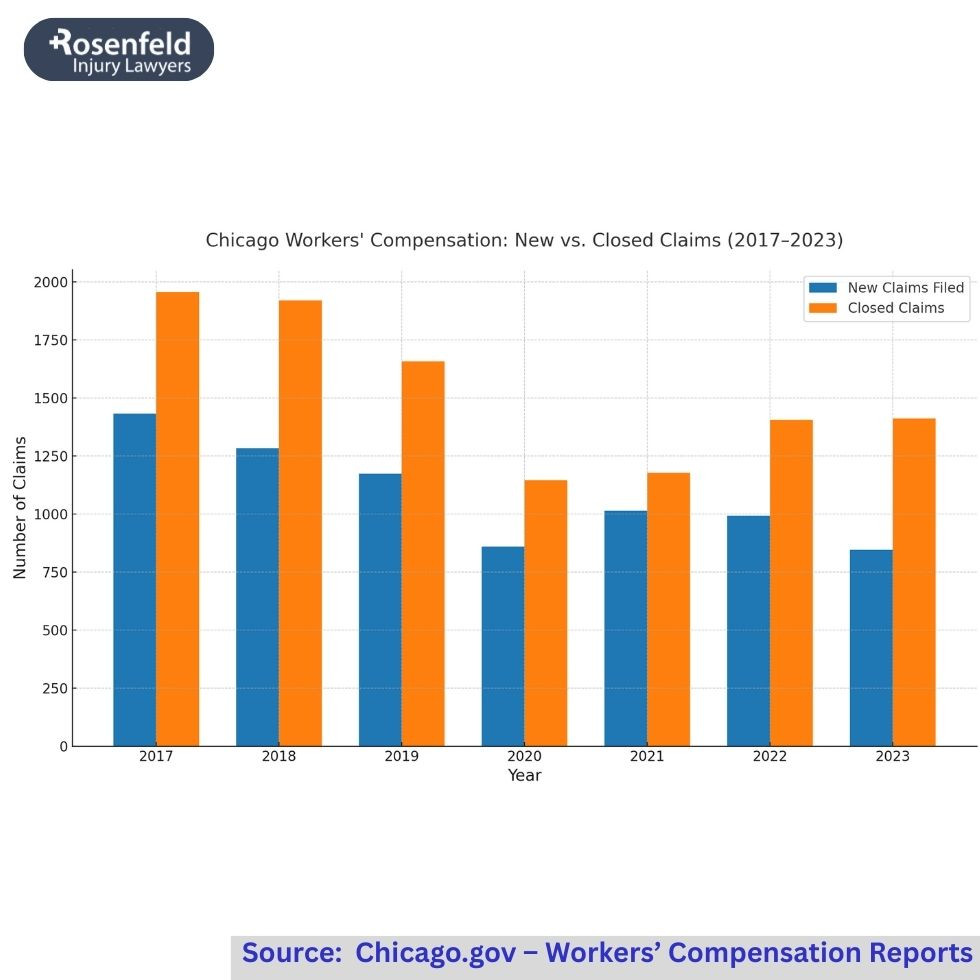
Worker Awarded $4.3M After Crash Leaves Him With Severe Brain Injury
A 62-year-old software developer was traveling for work when he lost control of his vehicle during an ice storm and collided with a jackknifed trailer. He suffered multiple injuries to his head, back, shoulder, and ribs, as well as a traumatic brain injury.
Following emergency treatment and multiple surgeries, he underwent inpatient neurorehabilitation and was later transferred to full-time assisted living. He continued to experience long-term physical, cognitive, and behavioral impairments. His legal team argued he was permanently and totally disabled and required lifelong medical support.
The case resolved in a $4.3 million settlement. The injured worker received $450,000 in an upfront payment, with the remainder placed in a structured payout guaranteeing over $15,000 per month for life. An additional $31,659 annually was allocated to a fund dedicated to future medical expenses.
Worker Wins Over $2.6M After Retaliatory Firing Linked to Work Injury Claim
A warehouse worker was terminated shortly after filing a workers’ comp claim for a shoulder injury. His legal team argued he was wrongfully fired in retaliation, causing financial and emotional harm. The defense claimed the termination was due to failure to follow leave policies, not the claim itself.
The injured worker pursued damages for lost income, mental anguish, and medical expenses. The jury awarded over $2.6 million, including $2.5 million in punitive damages and more than $30,000 for past medical costs.
Worker Secures $2M Settlement After Leg Amputation From Forklift Incident
A printing worker was struck by a forklift while on the job, suffering a severe crush injury that led to an above-the-knee amputation. He claimed he could no longer return to his profession and incurred nearly $250,000 in medical expenses. A workers’ compensation lien of nearly $400,000 was also noted.
The legal dispute focused on whether his only remedy was through the workers’ compensation system or if negligence by a staffing agency allowed a separate injury claim. The case settled for $2 million, the full amount of available insurance coverage.
Jury Awards Lifetime Workers’ Compensation Benefits to Common-Law Spouse After Fatal Work-Related Accident
After a fatal truck accident, the deceased worker’s partner sought lifetime death benefits under his employer’s workers’ compensation insurance policy, claiming she was his common-law spouse. The insurer denied her claim, arguing she was not a legal beneficiary.
At trial, the jury determined the two were married at the time of his death, entitling her to receive workers’ compensation benefits as his surviving spouse. Based on life expectancy, the potential lifetime value of the award exceeds $1 million.
Derrick Hand $737K Award After On-the-Job Back and Head Injury
A derrick hand suffered a concussion and serious spinal damage after being struck by a falling piece of equipment while working. He later underwent spinal fusion surgery and physical therapy, but was terminated after attempting to return to work.
Although the employer was not part of the workers’ compensation system, the worker claimed that no benefits were provided under their alternate coverage. The arbitrator awarded $737,358.20 in total compensation, including $200,000 in punitive damages.
Building a strong workers’ compensation claim starts with taking immediate and informed action after your injury. Whether you’re dealing with a minor accident or a serious work-related injury, the steps you take in the hours and days that follow can directly impact whether you receive full workers’ compensation benefits.
Here’s how to protect your case and improve your chances of securing the workers’ compensation benefits you’re entitled to:
By taking these steps early and consistently, injured workers in Chicago significantly improve their chances of receiving the full range of workers’ compensation benefits, including coverage for medical expenses, lost wages, and any applicable disability payments. Whether your claim is straightforward or complex, knowing how to respond from the beginning is key to protecting your health, your income, and your legal rights.

In Illinois, injured workers typically have three years from the date of the workplace injury to file a formal workers’ compensation claim with the IWCC. Alternatively, the deadline may be two years from the last date you received benefits, whichever is later. This timeframe is established under the Illinois Workers’ Compensation Act 820 ILCS 305/6(d).
Missing this filing window can cost you your right to receive workers’ compensation benefits, even if your injury was legitimate and clearly work-related. It’s equally critical to notify your employer of the injury within 45 days of when the injury occurred. Although Illinois law permits oral notice, written documentation is strongly recommended to confirm that the report was made on time.
Meeting both of these deadlines—early notification and timely claim filing—is one of the most important steps in preserving your rights under the Workers’ Compensation Act.
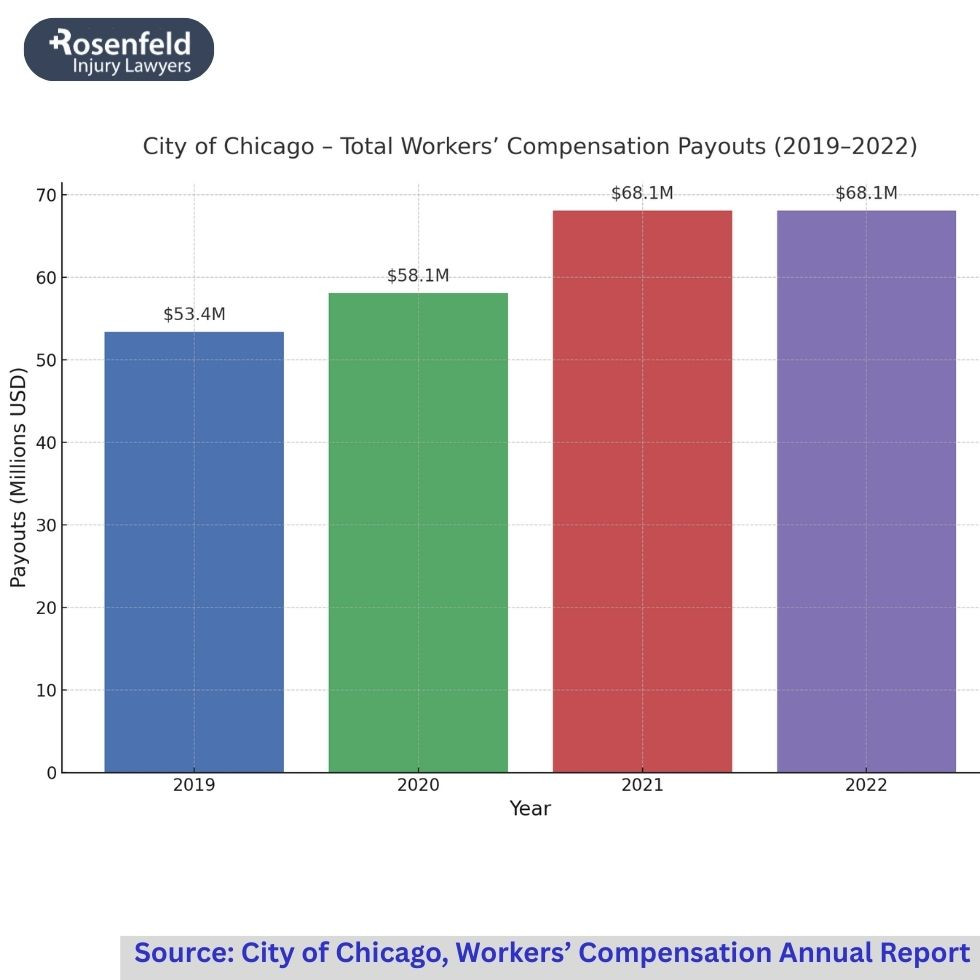
Filing a workers’ compensation claim in Chicago does not guarantee a straightforward or successful outcome. Many injured workers encounter delays, claim denials, or settlement offers that fail to fully cover their medical expenses, lost income, or long-term treatment needs. While the system is designed to support workers, the reality is that insurance companies often work to reduce payouts whenever possible.
Common challenges include:
These disputes often end up before the Illinois Workers’ Compensation Commission, and in some cases, they are appealed to local courts like the Circuit Court of Cook County.
A skilled Chicago workers’ compensation attorney can play a critical role in your case. We can:
Legal guidance becomes even more essential if your injury leads to long-term work restrictions, a dispute with your employer, or retaliation for reporting the injury.
With an experienced attorney on your side, you increase your chances of receiving the full scope of workers’ compensation benefits available under Illinois law and reduce the stress of handling a complex legal process on your own.
Yes. While most workplace injuries are handled through Illinois workers’ compensation, certain situations allow for legal action outside the traditional workers’ compensation system. In these cases, injured workers in Chicago may be eligible for additional compensation, especially when a third party or special employment classification is involved.
Each of these systems has its own requirements and procedures, separate from traditional workers’ compensation claims, and often requires legal representation to navigate effectively.
If your injury was caused by someone other than your employer—such as a subcontractor, property owner, delivery driver, or equipment manufacturer—you may be able to file a personal injury lawsuit. These third-party claims can recover compensation for damages not covered by workers’ compensation, including:
Common examples include construction site accidents caused by a negligent subcontractor, motor vehicle crashesduring work duties caused by an outside driver, or injuries resulting from faulty machinery. These claims are pursued in addition to, not instead of, your workers’ compensation benefits and often lead to broader financial recovery.
Some workers fall under federal or specialized benefit systems due to the nature of their jobs. These legal pathways offer separate protections and compensation structures outside the Illinois Workers’ Compensation Act.
The Jones Act protects maritime workers, such as crew members or seamen, who spend at least 30% of their work time aboard a vessel. If they’re injured due to their employer’s negligence, they have the right to sue directly for damages. This includes:
Unlike standard workers’ comp, the Jones Act places a legal burden on the employer and may result in significantly higher awards if negligence is proven.
The Federal Employers’ Liability Act (FELA) provides protection for nearly all U.S. railroad employees. FELA allows injured rail workers to sue their employer for full compensation, but they must prove some form of employer negligence.
Benefits under FELA can include:
FELA claims are often more complex than typical workers’ compensation claims, but they offer broader financial recovery and are commonly pursued by injured employees of Amtrak, Metra, and freight lines operating in and around the Chicago area.
The Illinois Workers’ Compensation Act does not cover Chicago police officers. Instead, they receive benefits through the Policemen’s Annuity and Benefit Fund of Chicago. The benefits available depend on the nature of the injury and whether it occurred on or off duty.
Occupational Disease Benefits: Available to officers with 10+ years of service who develop disabling heart or lung conditions. These benefits pay 65% of the officer’s salary.
Ordinary Disability Benefits: Available for injuries or illnesses unrelated to duty. Officers may receive up to 50% of their salary for up to five years.
Duty Disability Benefits: For injuries that happen in the line of duty. These benefits typically provide 75% of the officer’s salary, though that can be reduced to 50% depending on certain conditions.
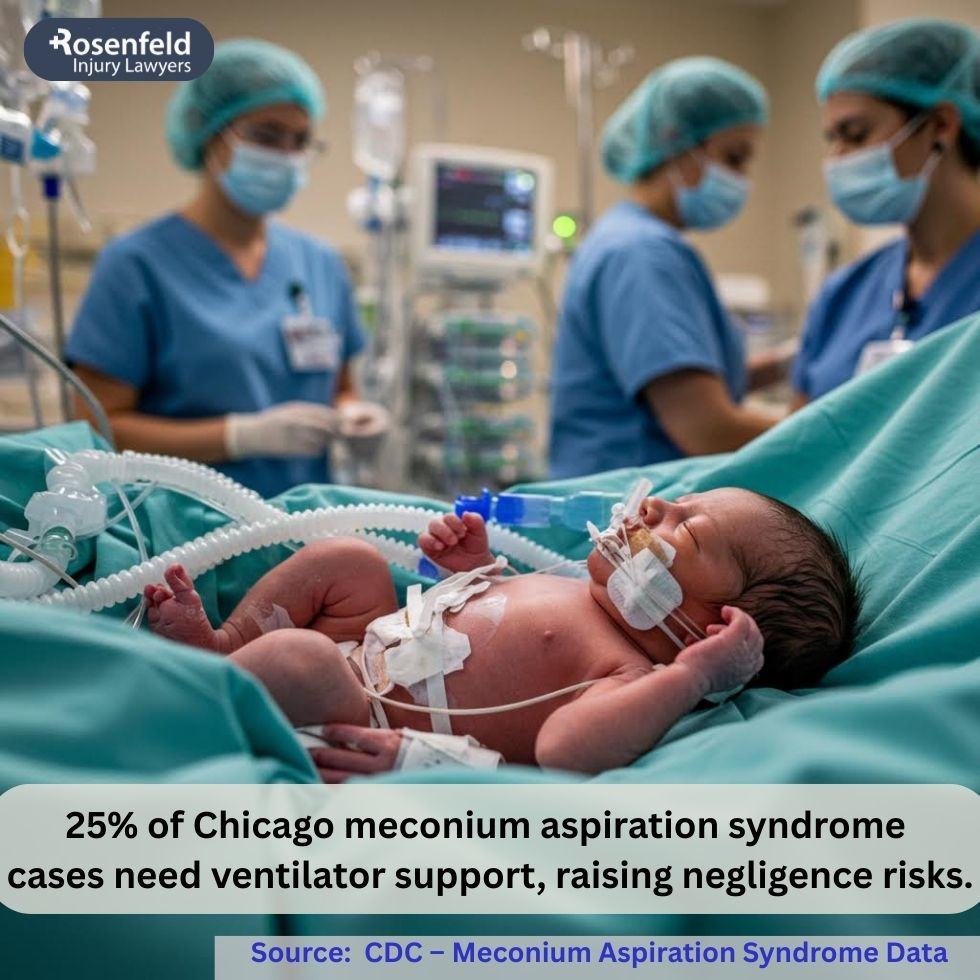
Workplace injuries remain a serious issue across Illinois. According to the most recent data from the Bureau of Labor Statistics (BLS), private industry employers in Illinois reported over 101,000 nonfatal occupational injuries and illnesses in 2023. This translates to an incident rate of 2.4 injuries per 100 full-time workers, which is in line with the national average.
Out of these cases, approximately 64,500 injuries resulted in days away from work, restricted duties, or job transfers. These are known as DART cases (Days Away, Restricted, or Transferred), and they represent more than half of all reported injuries in the state, meaning a significant portion of injuries were serious enough to interfere with regular job duties.
Breaking that down further:
Some industries expose workers to significantly higher risks of workplace injuries than others. For example, jobs in natural resources and mining report the highest injury rate—5.5 cases per 100 full-time employees—more than twice the statewide average. These dangerous jobs often involve hazardous conditions at oil terminals, environmental cleanup sites, and waste treatment facilities.
The trade, transportation, and utilities sectors follow closely behind with an injury rate of 3.6. Workers in these fields—including those in shipping hubs, warehouse operations, and energy services—face ongoing risks due to heavy equipment, tight deadlines, and unpredictable environments. Manufacturing also poses major hazards for injury victims, with an injury rate of 3.1. These workplaces often involve large machinery, fast-paced workflows, and exposure to high-risk conditions.
Even public sector workers are not exempt. Sanitation workers, bus drivers, and city maintenance crews face an injury rate of 4.0. While outside the private sector, these roles remain physically demanding and place injured workers at risk due to traffic exposure and infrastructure-related hazards.
Even within hazardous industries, some jobs present greater risk due to the type of work involved. In the Chicago area, common high-risk occupations include:
Recognizing the most common types of work-related injuries is important for identifying whether you’re eligible to receive workers’ compensation benefits.
These injuries develop gradually over time due to repeated physical motion or sustained physical effort. They are especially common among office workers, warehouse employees, manufacturing laborers, and healthcare workers performing tasks like lifting, typing, pushing, or working on assembly lines.
Examples of repetitive stress and overexertion injuries include:
These conditions often qualify for workers’ compensation benefits, especially when they interfere with your ability to perform normal job duties.
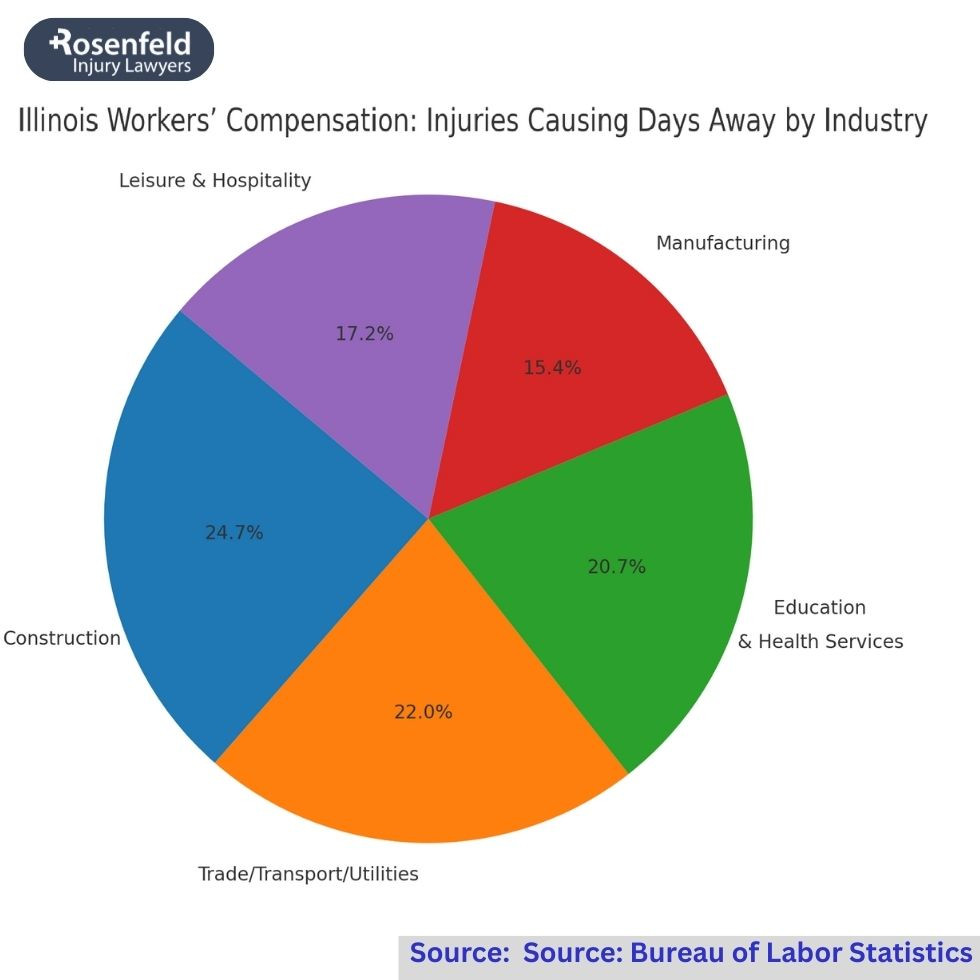
In industrial settings, chemical plants, hospitals, and custodial environments, employees may be exposed to toxic substances, infectious agents, or harmful environmental conditions. Prolonged exposure can lead to chronic illnesses or systemic injuries that develop over time.
Common occupational illnesses and exposure-related injuries include:
These cases may require strong documentation, such as OSHA reports, and may involve workers’ compensation claims or occupational disease benefits, depending on the diagnosis and exposure timeline.
Construction workers, drivers, and warehouse employees in Chicago are at heightened risk for injuries caused by being struck by equipment or falling objects, especially on job sites with heavy machinery.
Examples of trauma-related injuries include:
These injuries may result in temporary or permanent disability and often require a combination of medical treatment, lost wage recovery, and possibly vocational rehabilitation.
Falls remain one of the leading causes of serious workplace injuries in nearly every industry, including:
Fall-related injuries include:
Slip-and-fall incidents often qualify for temporary total disability benefits or permanent partial disability, depending on the extent of the injury and recovery period.
Common on construction sites, loading docks, and factory floors, these injuries occur when workers become pinned between heavy equipment, struck by moving parts, or trapped under collapsing materials.
Examples include:
These are often some of the most severe workplace injuries and may justify permanent total disability claims.
Electricians, industrial workers, and construction laborers face frequent risks of burns and electric shock, particularly when working near flammable materials or energized equipment.
Types of burn and electrical injuries include:
These injuries often require long-term medical care and, in serious cases, vocational rehabilitation.
Some occupations carry a greater risk of intentional harm from others. Security personnel, hospital staff, educators, and customer-facing workers (e.g., transit or social service employees) may be injured in violent incidents.
Examples include:
Sadly, some Chicago workers lose their lives while performing job-related duties, particularly in high-risk fields such as construction, transportation, energy, and manufacturing.
Common causes of fatal injuries include:
In these cases, surviving family members may be eligible for death benefits, including lost income replacement and funeral costs, under Illinois law.
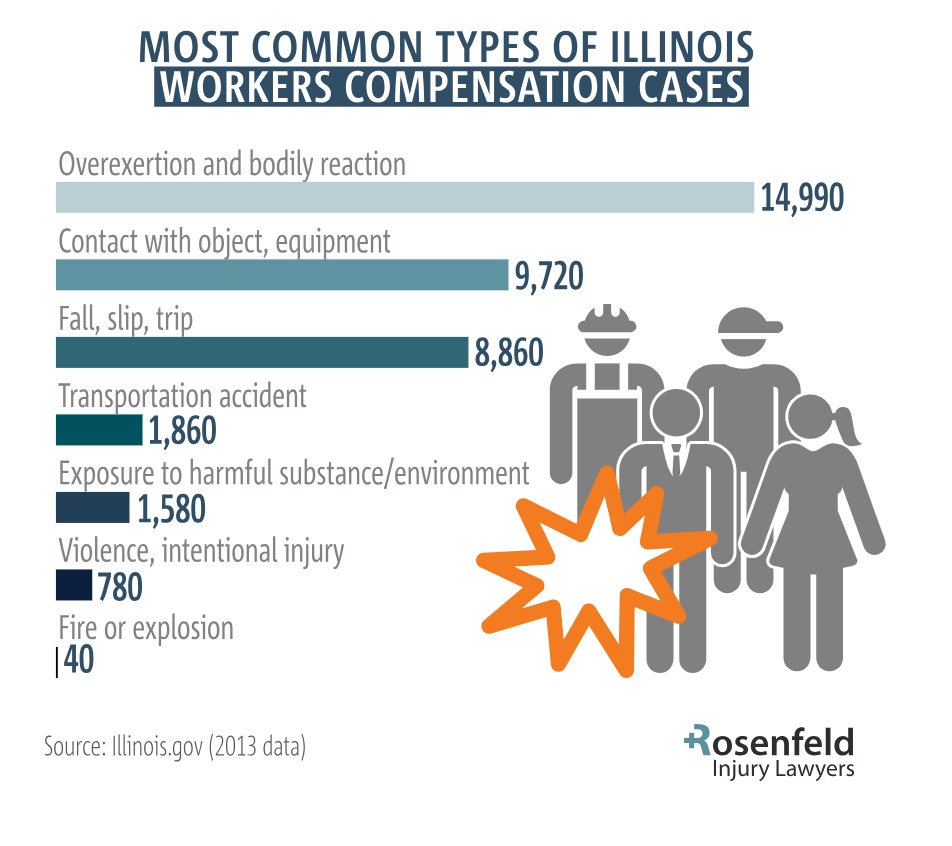
Even with clear evidence of a work-related injury, many injured workers in Chicago face major challenges when filing for workers’ compensation benefits. Claims may be delayed, denied, or underpaid, often without a clear explanation. These problems usually stem from disputes raised by insurance companies or missteps by employers.
Common issues include:
Our top-rated Chicago workers’ compensation attorneys work to correct these issues by gathering detailed medical records, coordinating with specialists, and securing expert opinions that support your claim. We also hold employers accountable when they fail to comply with workers’ compensation laws or reporting requirements.
When necessary, we:
Whether you’re dealing with a denied claim or an unreasonably low settlement offer, our firm can step in to protect your rights and advocate for the outcome you deserve.
A knowledgeable workers’ compensation attorney is one of the most important resources an injured employee can have during the claim process. From the moment your injury occurs, having legal support helps ensure everything is handled correctly, minimizing risk, delays, and costly mistakes.
Here’s what we do:
Our legal team also:
By managing every part of the legal process, our attorneys help ensure that injured workers in Chicago receive full workers’ compensation benefits.
You should report the injury to your employer within 45 days; the sooner the better. Include the date, time, how it happened, and where. Written notice is strongly recommended. After that, your employer should notify their insurance provider. If they don’t, or if your claim is denied or delayed, you can file directly with the Illinois Workers’ Compensation Commission.
You’re not legally required to hire an attorney, but doing so often leads to better results. A workers’ compensation lawyer can help gather records, handle disputes, deal with the insurance company, and pursue full compensation if your claim is denied, delayed, or undervalued.
Our workers’ compensation attorneys work on a contingency fee basis, meaning you pay nothing up front. If we recover benefits for you, we receive a percentage we previously agreed upon. If your case is unsuccessful, you owe us nothing.
Anyone injured while performing job-related duties in Chicago may file. This includes full-time, part-time, seasonal, and union workers. Some roles, like independent contractors, may not qualify. A workers’ compensation attorney can help determine eligibility.
No. It’s illegal for an employer to retaliate against you for filing a claim. If you’re fired, demoted, or harassed after reporting your injury, you may have a legal case for retaliation.
Retaliation is against the law. If you’re threatened, pressured, or intimidated for filing a claim, document everything and speak with a workers’ compensation attorney to protect your rights.
Yes. Immigration status doesn’t affect your right to receive benefits like medical care and lost wages. Retaliation or denial based on immigration status is illegal.
Your employer’s insurance carrier typically pays for care related to your injury. If there are delays, your lawyer can pressure the insurance company to cover medical expenses promptly.
You can, but it’s not recommended. Using your own health insurance might lead to coverage issues. Your employer’s policy is supposed to cover work-related injuries.
Be cautious. Some forms may allow access to unrelated or private records. Have a lawyer review the release to protect your privacy and prevent improper use of your medical history.
Yes, in most cases, you can pick two doctors. If your employer has a Preferred Provider Program (PPP), you’ll need to opt out in writing. Otherwise, you’re free to use your own physician.
Yes, but it may count as one of your two choices. If you didn’t voluntarily choose that doctor, your rights may not be affected. A workers’ compensation attorney can help clarify your options.
You can still qualify. Chronic issues—like carpal tunnel syndrome or exposure-related illnesses—are covered if they’re caused or worsened by your job duties. Medical documentation is key.
You may still qualify if your work aggravated or worsened the condition. Clear medical evidence can help show that your job contributed to your current health problems.
Most employers are legally required to carry coverage. If they don’t, you may be able to file through the Illinois Injured Workers’ Benefit Fund (IWBF), which helps injured employees when their employer failed to comply with insurance laws.
There’s a three-day waiting period. If you’re unable to work for more than 14 days, the first three days are paid retroactively. Payments are based on your average weekly wage.
Payments come from your employer’s insurance provider and usually equal two-thirds of your average weekly earnings. If there’s a delay or denial, a lawyer can advocate for timely compensation.
You may qualify for vocational rehabilitation benefits, including retraining, placement assistance, or education. These support you while you transition to a new role.
If the light-duty job accommodates your limitations without reducing your long-term earning power unfairly, you may be expected to accept it. If not, a lawyer can help protect your future income.
Yes. If you were injured while doing your job—even from home—you can still qualify. Document the injury clearly and speak with a lawyer if your claim is challenged.
No. Injuries at off-site locations or during approved job duties still qualify. For example, if you’re hurt in a motor vehicle accident while traveling for work or at a customer’s site, you’re still covered.
A failed test doesn’t automatically disqualify you. The employer must prove the substance caused the injury. If the test was unfair or unrelated, you may still qualify.
It varies. Simple cases may resolve in months; complex cases involving long-term care, serious injury, or disputes may take over a year. Reaching maximum medical improvement speeds up settlement negotiations.
Not without legal advice. Initial offers often undervalue claims. Once you accept a settlement, you generally can’t ask for more, even if your condition worsens later.
Be honest and specific. Include when, where, and how the injury happened, your symptoms, and how it impacts your ability to work. Medical documentation is critical for your claim.
Yes. If your condition prevents you from working long-term, you may qualify for SSDI in addition to your workers’ compensation benefits. A lawyer can help you coordinate both without losing coverage.
Workers’ comp doesn’t require proof of negligence and typically covers lost wages and medical costs. Personal injury lawsuits allow claims for pain and suffering, but usually don’t apply if your employer has insurance, unless a third party caused the injury.
Generally, no. But if your employer doesn’t carry insurance or intentionally caused the harm, you may be able to file a personal injury lawsuit. A lawyer can assess your options.
An IME is a medical evaluation requested by the insurance company to assess your injury. While it’s called “independent,” the insurer pays the doctor, so it’s important to prepare and understand how it may affect your benefits.

If you’ve suffered injuries at work, you shouldn’t have to navigate the legal process alone. At Rosenfeld Injury Lawyers, our Chicago personal injury lawyer team has helped countless injured workers throughout Cook County and Illinois recover full workers’ compensation benefits, covering medical expenses, lost income, and long-term support for serious conditions.
We represent injured employees on a contingency fee basis, so you pay nothing unless we win your case. Whether you’re dealing with denied medical bills, delays from insurance companies, or challenges returning to work after a serious work-related injury, our experienced workers’ compensation attorneys are here to help.
Contact us now for a free consultation. Let our law firm fight for your right to receive the benefits and financial security you deserve.
Our downtown office, near the Richard J. Daley Center, Dirkson United States Courthouse, and the Chicago Workers’ Compensation Commission, offers convenient access from Aurora, Joliet, and Waukegan via I-90, I-94, and I-290.
225 W Wacker Dr #1660
Chicago, IL 60606
Phone: (847) 835-8895
All content undergoes thorough legal review by experienced attorneys, including Jonathan Rosenfeld. With 25 years of experience in personal injury law and over 100 years of combined legal expertise within our team, we ensure that every article is legally accurate, compliant, and reflects current legal standards.